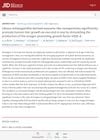 3 citations,
May 2019 in “Journal of Cosmetic Dermatology”
3 citations,
May 2019 in “Journal of Cosmetic Dermatology” Miliacin with polar lipids helps hair growth and improves hair loss in women.
 3 citations,
January 2005 in “Biological & Pharmaceutical Bulletin”
3 citations,
January 2005 in “Biological & Pharmaceutical Bulletin” The peptide GPIGS helps hair cells grow and speeds up hair regrowth in mice.
 2 citations,
April 2021 in “International Journal of Pharmaceutics”
2 citations,
April 2021 in “International Journal of Pharmaceutics” Serum formulations were better at delivering molecules to the hair bulb than nanoparticles.
2 citations,
August 2007 in “PubMed” Topical scalp treatments could potentially reduce hair extraction.
 January 2024 in “Natural product research”
January 2024 in “Natural product research” The bulb and shoot of Allium longisepalum contain various compounds with potential health benefits, including antioxidant and anti-inflammatory properties.
October 2019 in “DOAJ (DOAJ: Directory of Open Access Journals)” The nanoparticles effectively deliver herbal extract to enhance hair growth.
September 2019 in “Journal of Investigative Dermatology” IL-17 and certain immune cells are linked to more severe alopecia areata.
130 citations,
December 1998 in “The journal of investigative dermatology/Journal of investigative dermatology” Hair follicle melanocytes die during hair regression.
 August 2023 in “International Journal of Molecular Sciences”
August 2023 in “International Journal of Molecular Sciences” The human scalp hair bulb contains different types of melanocytes with varying abilities to produce melanin.
 April 2017 in “Journal of Investigative Dermatology”
April 2017 in “Journal of Investigative Dermatology” Scientists created a tiny, 3D model of a hair follicle that grows and acts like a real one.
December 1990 in “PubMed”  19 citations,
April 2015 in “International Journal of Molecular Sciences”
19 citations,
April 2015 in “International Journal of Molecular Sciences” The research identified genes and pathways important for sheep wool growth and shedding.

The human scalp has different types of pigment cells in hair follicles with varying abilities to produce pigment.
 September 2016 in “Journal of dermatological science”
September 2016 in “Journal of dermatological science” The OVOL1-OVOL2 axis is important for hair follicle differentiation and can help diagnose certain hair-related tumors.
 14 citations,
October 2020 in “Scientific reports”
14 citations,
October 2020 in “Scientific reports” Hair greying is linked to reduced ATM protein in hair cells, which protects against stress and damage.
 102 citations,
December 2017 in “The journal of investigative dermatology. Symposium proceedings/The Journal of investigative dermatology symposium proceedings”
102 citations,
December 2017 in “The journal of investigative dermatology. Symposium proceedings/The Journal of investigative dermatology symposium proceedings” Restoring hair bulb immune privilege is crucial for managing alopecia areata.
78 citations,
June 2003 in “Journal of the American Academy of Dermatology” Curly hair shape is determined by the hair bulb.
 July 2024 in “Skin Research and Technology”
July 2024 in “Skin Research and Technology” The products significantly promote hair growth and maintain hair bulb health.
 150 citations,
April 1999 in “Dermatologic Clinics”
150 citations,
April 1999 in “Dermatologic Clinics” Laser hair removal effectiveness depends on targeting hair structures without harming the skin, and improvements require more research and expert collaboration.
 20 citations,
November 1968 in “The Lancet”
20 citations,
November 1968 in “The Lancet” Potassium levels affect blood sugar and insulin during dialysis, and malnutrition changes children's hair roots.
 15 citations,
September 1999 in “British Journal of Dermatology”
15 citations,
September 1999 in “British Journal of Dermatology” Epimorphin, a protein, plays a key role in the development of hair follicles in human fetuses, but it doesn't help in maintaining the stem cell population of the follicular skin layer.
 6 citations,
December 2019 in “BMC Complementary and Alternative Medicine”
6 citations,
December 2019 in “BMC Complementary and Alternative Medicine” Alcohol extract from Vernonia anthelmintica seeds may help treat stress-related hair loss.
 1 citations,
October 2020 in “PubMed”
1 citations,
October 2020 in “PubMed” Azelaic acid helps protect hair cells from UV damage and encourages hair growth by increasing certain gene expressions and proteins.
 July 2024 in “Journal of Investigative Dermatology”
July 2024 in “Journal of Investigative Dermatology” Ashwagandha nanoparticles help hair grow by increasing a growth factor.
 July 2024 in “Pharmaceutical Development and Technology”
July 2024 in “Pharmaceutical Development and Technology” Microsponges with rosemary oil significantly improve hair growth compared to regular rosemary oil and minoxidil.
 June 2022 in “International journal of drug delivery technology”
June 2022 in “International journal of drug delivery technology” Nebivolol cream may be a promising hair loss treatment by improving blood flow and nourishing hair follicles.
 314 citations,
April 2010 in “Developmental Cell”
314 citations,
April 2010 in “Developmental Cell” β-catenin in the dermal papilla is crucial for normal hair growth and repair.
 291 citations,
October 2005 in “Proceedings of the National Academy of Sciences of the United States of America”
291 citations,
October 2005 in “Proceedings of the National Academy of Sciences of the United States of America” Adult stem cells from rat whisker follicles can regenerate hair follicles and sebaceous glands.
 128 citations,
March 2006 in “American Journal of Pathology”
128 citations,
March 2006 in “American Journal of Pathology” Prolactin contributes to hair loss by promoting hair follicle shrinkage and cell death.
 109 citations,
October 2007 in “Journal of pineal research”
109 citations,
October 2007 in “Journal of pineal research” Melatonin helps regulate hair growth and protects the hair follicle from stress.
























